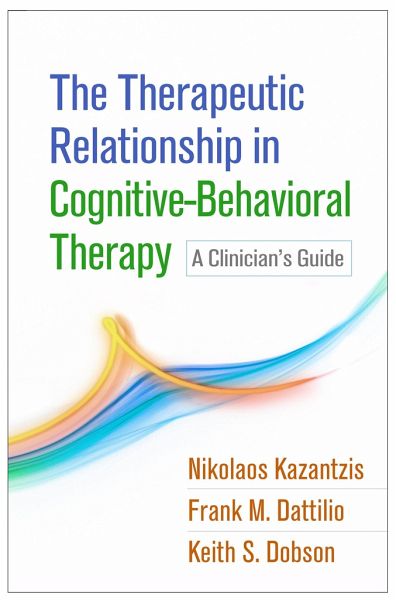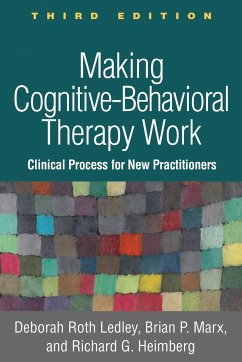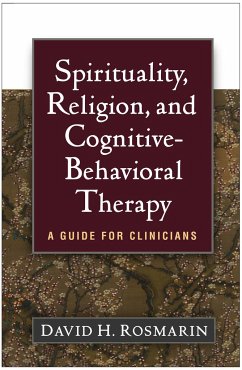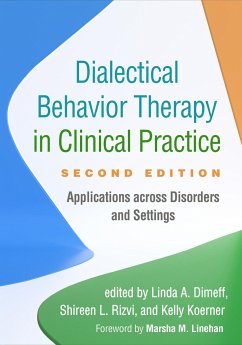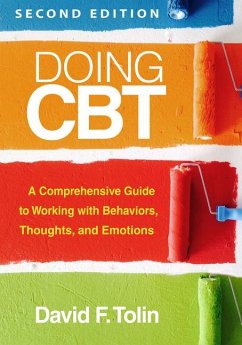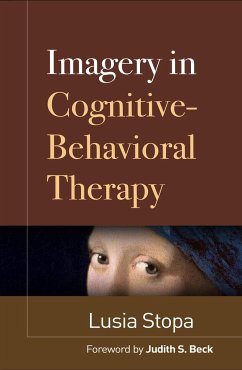Nikolaos Kazantzis (Australia Monash University)Frank M. DattilioKeith S. Dobson (Canada University of Calgary)
Gebundenes Buch
The Therapeutic Relationship in Cognitive-Behavioral Therapy
A Clinician's Guide
Versandkostenfrei!
Versandfertig in über 4 Wochen
Weitere Ausgaben:

PAYBACK Punkte
20 °P sammeln!




From leading cognitive-behavioral therapy (CBT) experts, this book describes ways to tailor empirically supported relationship factors that can strengthen collaboration, empiricism, and Socratic dialogue and improve outcomes. In an accessible style, it provides practical clinical recommendations accompanied by rich case examples and self-reflection exercises.
Nikolaos Kazantzis, PhD ("Nik"), is Founding Director of the Cognitive Behavior Therapy Research Unit (CBTRU), based in Melbourne, Australia, and is an adjunct faculty member at the Beck Institute for Cognitive Behavior Therapy. The research conducted by the CBTRU team has yielded over 200 scholarly publications, including 6 books for clinicians, and is highly cited by the international scientific community; for example, an article coauthored by Dr. Kazantzis was the most downloaded article across all 89 journals of the American Psychological Association in 2019. Dr. Kazantzis is Editor-in-Chief of the journal Cognitive and Behavioral Practice and Editor of Springer Nature's "CBT: Science into Practice" book series. In recognition of his scholarly contributions, he has received the Beck Scholar Award from the Beck Institute for Cognitive Behavior Therapy. Dr. Kazantzis has designed national CBT training programs for the Australian Psychological Society and has delivered CBT training in 23 countries worldwide. Now retired from academia, Dr. Kazantzis runs a private practice in Toorak, Melbourne, Australia. His websites are www.nikolaoskazantzis.com and www.cbtru.com. Frank M. Dattilio, PhD, ABPP, is a Teaching Associate (part-time) in Psychiatry at Harvard Medical School and Clinical Associate in Psychiatry at the University of Pennsylvania School of Medicine. He is also a practicing clinical psychologist in Allentown, Pennsylvania, where he provides individual, couple, and family therapy. Dr. Dattilio has presented extensively throughout the world on treating a wide range of disorders using CBT and has been active in research, professional education, training, and supervision of psychiatrists and mental health professionals. His more than 300 publications include 23 books in the areas of couple and family therapy, anxiety and behavioral disorders, and clinical and forensic psychology. Dr. Dattilio serves on the editorial boards of a number of professional journals and is the recipient of numerous awards for outstanding achievement in the fields of psychology and psychotherapy. Keith S. Dobson, PhD, is Professor of Clinical Psychology at the University of Calgary, Alberta, Canada, and a Principal Investigator for the Opening Minds program of the Mental Health Commission of Canada, with a focus on stigma reduction in the workplace. His research has focused on both cognitive models and CBT for depression. Dr. Dobson has published over 230 articles and chapters, 13 books, two DVDs, and one DVD series. He is a past president of the Canadian Psychological Association (CPA), the Academy of Cognitive and Behavioral Therapies, and the International Association for Cognitive Psychotherapy. Dr. Dobson is a recipient of the Award for Distinguished Contributions to the Profession of Psychology and the Donald O. Hebb Award for Distinguished Contributions to the Science of Psychology from the CPA, among other honors.
Produktdetails
- Verlag: Guilford Publications
- Seitenzahl: 288
- Erscheinungstermin: 7. August 2017
- Englisch
- Abmessung: 236mm x 156mm x 27mm
- Gewicht: 540g
- ISBN-13: 9781462531288
- ISBN-10: 1462531288
- Artikelnr.: 47123925
Herstellerkennzeichnung
Libri GmbH
Europaallee 1
36244 Bad Hersfeld
gpsr@libri.de
Für dieses Produkt wurde noch keine Bewertung abgegeben. Wir würden uns sehr freuen, wenn du die erste Bewertung schreibst!
Eine Bewertung schreiben
Eine Bewertung schreiben
Andere Kunden interessierten sich für



